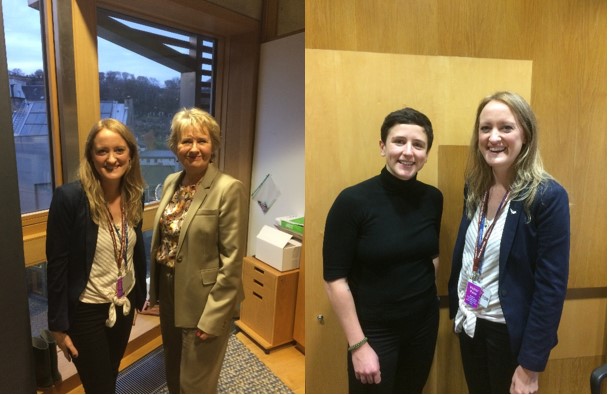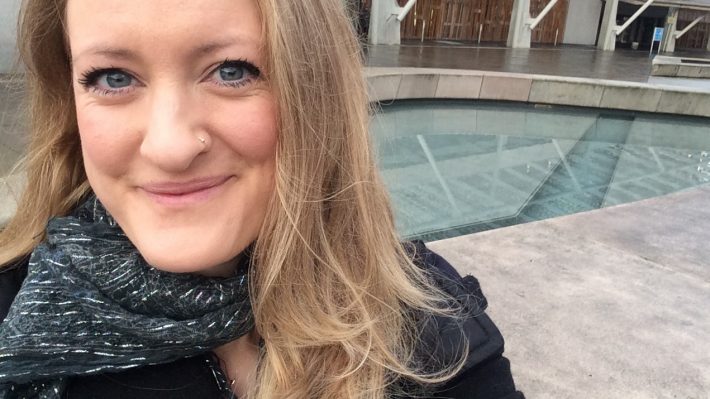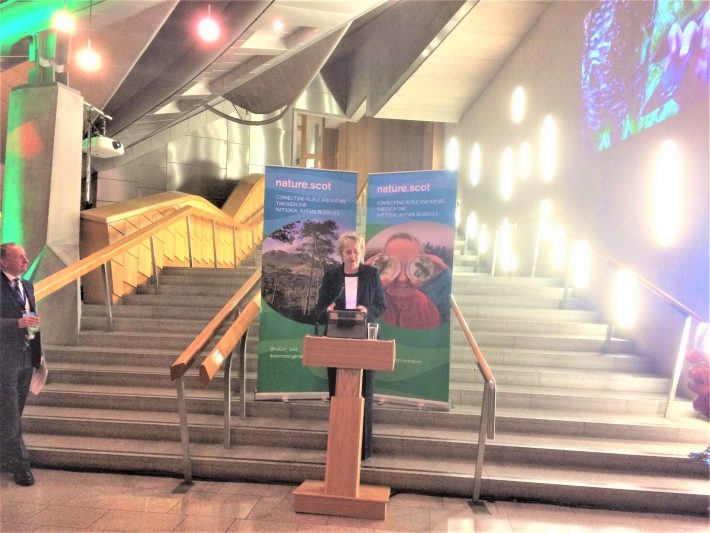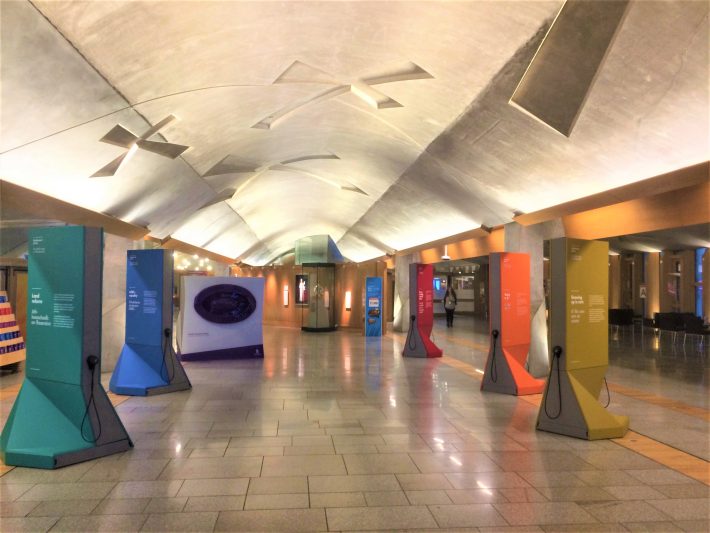Parliament and policy-making: the importance of collaborative work between scientists and policy makers.
Lucy Quinn, spent two days in the Scottish Parliament shadowing the Cabinet Secretary, Roseanna Cunningham MSP and the Minister Mairi Gougeon MSP. Find out how she got on……

Summary of the two days shadowing
As I approached the fabled Holyrood on a typically cold, crisp Edinburgh morning I was a little apprehensive about what to expect from shadowing the Cabinet Secretary, for the Environment, Climate Change and Land Reform, Roseanna Cunningham MSP and the Minister for Rural Affairs and the Natural Environment Mairi Gougeon MSP for the next two days. Happily, once I entered and met the Cabinet Secretary’s private secretary Kyle he made me feel very welcome, quickly setting me up with a desk where I could observe all the comings and goings in-between meetings. I currently work as a policy and advice officer in marine ornithology for Scottish Natural Heritage (SNH), and I was eager to see how my work as an advisor to government fitted into the wider process.

My first appointment was to sit in on a Committee meeting about the Deposit Return Scheme (DRS) which will hopefully become law in 2020, making it the first bottle deposit scheme in the UK. What struck me was just how detailed the questions from the committee were for the Cabinet Secretary in relation to the potential concerns. Every justification for the scheme was scrutinised and debated, with Ms Cunningham and advisors having to answer on a plethora of topics. Ms Cunningham reiterated the importance of the strong public support behind this scheme and the effect of Blue Planet 2 had on helping with this support was also noted.
Having been directly involved with working on Blue Planet 2 it was amazing to see its impact, and more than a little surreal to hear it be referenced within Scottish Parliament.
It demonstrated the importance of having a clear message to the public on an environmental topic.
My next shadowing experience was to hear Mairi Gougeon MSP deliver a speech on Plant Health in the Chamber itself. I was firstly struck with how the public can come and go in the Chamber, and listen to the MSPs during these sessions. Ms Gougeon delivered an impassioned speech on why plant health matters and brought up the importance of our world leading Scottish research institutes, such as the James Hutton Institute, for assessing impacts and threats to biodiversity due to invasive non-native species. This is something which SNH is also taking seriously and working on extensively. In her speech Ms Gougeon highlighted the role urban trees might play in helping mitigate against climate change, and also commended community groups and volunteer work, particularly regarding their work in tackling invasive plant species. Throughout, I realised how important facts and figures are used within speeches and how scientific research is communicated in a way that makes it meaningful and comprehensible for people, both economically and practically. After the plant health speech, I was able to listen to further discussions including on sea fisheries and on the Year of Coasts and Waters, something that SNH will be heavily involved in for 2020.
Despite being hugely busy, Kyle managed to take me through what a typical weekly calendar looks like for Ms Cunningham, and how the workload is managed.
The stand out message I took from this was just how many submissions an MSP can receive each day: about 20-30 submissions come in that will have to be dealt with on a daily basis.
This very much put my own work on marine Special Protection Areas, which will eventually come through the Minister’s inbox, into perspective. There is a whole range of work for which decisions are required in this fast paced environment. The importance of having such a good team behind and working alongside the Minister became clear to me and also served to reiterate how lucky I am in my current role to have such supportive colleagues within the Marine Ecosystems and Sustainable Coasts and Seas teams, which ultimately facilitates more productive work.
That evening SNH hosted a Parliamentary Event at Holyrood showcasing the fantastic work that the National Nature Reserves (NNR) do, as well as revealing the rebranding of SNH to NatureScot (which will come into effect on 1st May 2020). Ms Cunningham delivered a speech at the event and then met with various NNR staff and stakeholders and I had the chance to chat informally with other Parliament members.

The following day after a tour of the Parliament building itself, I got to walk with Ms Cunningham and Kyle to Dynamic Earth, where the Minister was giving a speech at the Royal Society of Chemistry ‘Science and the Parliament 2019’ event. In her speech the importance of scientific evidence was again mentioned as being crucial in decision-making processes, as was the need to tackle climate change head on. The point was made that huge shifts in how we live will be required for Scotland to meet with 2045 net zero carbon target. Scotland is the only country in the world to set themselves annual targets to meet the 2045 target. Ms Cunningham also reiterated the need to ensure there are no bias in opportunities in terms of gender, age, background, etc. in making Scotland a science and research nation and the importance of the STEM scheme was also mentioned.
My final shadowing experience was to have the opportunity for one-to-one chats with both Ms Gougeon and Ms Cunningham. As an SNH marine ornithology advisor, we consider scientific evidence as the most important factor when advising on how a development may impact on the natural environment, but it was striking to see a summarised list of other factors the MSPs consider including: legal advice, financial advice, socio-economic implications, and so on. One topic of discussion related to a field site where I previously carried out work for SNH at, once again bringing the relevance of my own work into the fore.

Main messages and what I will take away for my current job:
Certain words kept coming up in different sessions throughout my time at Parliament: climate change, evidence, experts, biodiversity, and uncertainty (particularly of funding). There is a step-change ahead of us in terms of how we will tackle climate change and biodiversity loss and it is with baited breath that we await to see what resources will be made available to fund the required work and expertise required. It is clear that it will require strong leadership from the top, but also the support of public opinion in order to affect the huge change that is required.
At the end of our conversation together Ms Cunningham encouraged me to think about the consequences of my work, and to have the top line messages clearly laid out when submitting advice.
Whilst I will always be giving advice based on the evidence and my specialist expertise, it is certainly something that I will take forward in my future work. Being more succinct in the main messages coming from our work is something our whole team can bear in mind.
Final thoughts
Sharing ideas and collaborating with others is crucial for solving complex and challenging issues that the marine world faces today. It is all too easy to unintentionally have tunnel vision when it comes to your own speciality, but seeing how the scientific and policy recommendations in SNH are influenced, and also used in parliament, was hugely valuable.
I also left feeling a renewed pride for my own role in this process and also encouraged that the strong female leadership within my own team in SNH is also reflected within Parliament with passionate individuals such as Ms Cunningham and Ms Gougeon.
Sincere thanks to the BES for this opportunity and thanks to Ms Cunningham and Ms Gougeon and their teams for their time. On a personal note, I was delighted to see the Cabinet Secretary winning the Political Advocate of the Year Award in the RSPB Nature of Scotland Awards, for recognition of her hard work as Environment, Climate Change and Land reform Secretary.
Ensuring that nature conservation is at the forefront of MSPs minds is more crucial than ever before. It is clear that nature can be a major part of the solution for the climate change emergency ahead. Furthermore, connecting people with nature is hugely important to ensure support for nature-based solutions. I will continue to be passionate about nature and advocate for it – and getting to take part in the shadowing scheme has served to demonstrate to me that our work can and does make a difference, you’ve just got to keep that big picture in mind!
Like what we stand for?
Support our mission and help develop the next generation of ecologists by donating to the British Ecological Society.